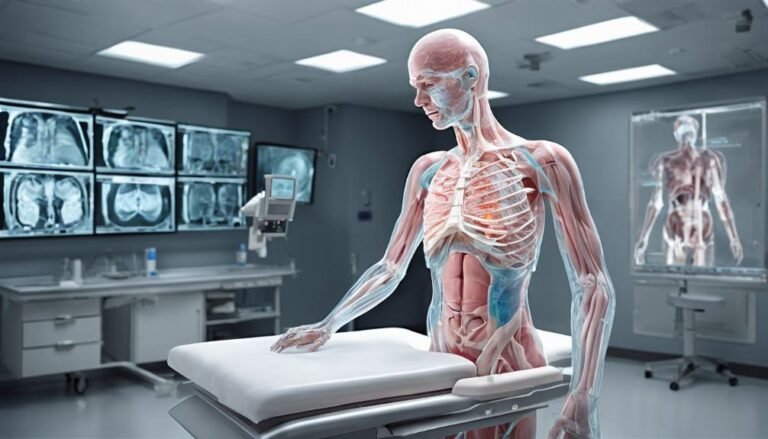AI for Predictive Healthcare
You might not realize the extent to which AI is reshaping the landscape of healthcare, particularly in predictive applications. Imagine a scenario where illnesses are foreseen before symptoms even surface, and treatments are tailored precisely to your unique needs. The integration of AI in healthcare is not just a futuristic concept; it's a reality that is revolutionizing how we approach patient care and disease management. The potential for predictive healthcare utilizing AI is vast, promising a future where early intervention and personalized medicine become the norm, rather than the exception.
Key Takeaways
- AI analyzes vast health data for disease risk assessment.
- Early disease detection through advanced algorithms improves patient outcomes.
- Personalized treatment recommendations tailored to individual health profiles.
- AI enhances personalized patient care with remote monitoring and predictive analytics.
- Predictive healthcare optimizes resource allocation and enables proactive interventions.
AI Applications in Healthcare
How can artificial intelligence revolutionize healthcare through its diverse applications and predictive capabilities?
AI-powered diagnosis assistance and machine learning for patient monitoring are two key areas where AI is making significant strides in healthcare.
AI-powered diagnosis assistance systems utilize extensive amounts of medical data to help healthcare providers make more accurate and timely diagnoses. These systems can analyze symptoms, medical images, and patient history to provide recommendations to healthcare professionals, ultimately improving diagnostic accuracy and efficiency.
Moreover, machine learning for patient monitoring enables healthcare providers to track patient health data in real-time and identify potential issues before they escalate. By analyzing data such as essential signs, activity levels, and medication adherence, machine learning algorithms can alert healthcare professionals to any concerning trends or anomalies, allowing for early intervention and personalized care.
Incorporating AI in these ways not only enhances the quality of patient care but also helps healthcare organizations optimize resources and improve overall operational efficiency.
AI's ability to process and analyze extensive amounts of data quickly and accurately is transforming the healthcare landscape, paving the way for more personalized and effective medical interventions.
Predictive Analytics in Medicine
Explore the field of Predictive Analytics in Medicine, where data-driven patient outcomes, early disease detection, and personalized treatment recommendations reign supreme.
By harnessing the power of advanced algorithms and machine learning, healthcare providers can now predict potential health issues before they escalate, leading to proactive interventions and improved patient care.
This approach enables a shift towards personalized medicine, tailoring treatments to individual needs based on predictive insights derived from vast amounts of medical data.
Data-Driven Patient Outcomes
Data-driven patient outcomes in medicine are increasingly being shaped by the integration of predictive analytics, allowing healthcare providers to anticipate and address potential health issues proactively.
Remote monitoring plays a pivotal role in this paradigm by enabling continuous patient data tracking outside clinical settings. Through remote monitoring devices like wearables and sensors, healthcare professionals can gather real-time data on essential signs, activity levels, and other health metrics, contributing to a more thorough understanding of individual health statuses. This continuous stream of data facilitates early identification of health deviations, empowering providers to intervene promptly and prevent adverse outcomes.
Furthermore, predictive analytics applied to population health data enables healthcare organizations to identify trends and risk factors within specific patient groups. By analyzing aggregated data sets, healthcare providers can predict potential health concerns at a population level, allowing for targeted interventions and resource allocation.
The integration of data-driven insights into patient care pathways enhances the quality of care delivery and fosters better health outcomes for individuals and communities alike.
Early Disease Detection
Predictive analytics in medicine plays an essential role in early disease detection by leveraging data insights to identify potential health issues before symptoms manifest. Disease screening through advanced algorithms and machine learning models allows healthcare providers to detect abnormalities at an early stage, increasing the chances of successful treatment outcomes.
By analyzing large datasets, AI can recognize patterns and risk factors that might go unnoticed through traditional diagnostic methods.
Early intervention is pivotal in improving patient outcomes and reducing healthcare costs. AI-powered tools can help identify individuals at high risk of developing certain conditions, enabling proactive measures to be taken.
Through continuous monitoring and analysis of health data, AI can provide personalized recommendations for preventive actions or interventions tailored to each individual's unique health profile.
Personalized Treatment Recommendations
In the domain of predictive healthcare, the focus shifts towards providing personalized treatment recommendations based on individual health data and predictive analytics models. By utilizing data-driven diagnoses, healthcare providers can tailor treatment plans to meet the specific needs of each patient. This level of treatment customization allows for personalized therapy options that consider factors such as genetic predispositions, lifestyle choices, and environmental influences.
Predictive care strategies play a significant role in recommending treatments that aren't only effective but also well-suited to an individual's unique health profile. Through the analysis of vast amounts of patient data, predictive analytics can identify patterns and trends that assist in determining the most suitable course of action for a particular condition.
This targeted approach to healthcare ensures that patients receive the most appropriate care, leading to improved outcomes and a more efficient use of healthcare resources.
Preventive Healthcare Solutions
Effective preventive healthcare solutions play an essential role in reducing the burden of disease and improving overall population health outcomes. Wellness programs and preventive measures are vital components of preventive healthcare strategies.
Wellness programs encompass a range of activities aimed at promoting healthy behaviors and preventing illness before it occurs. These programs often focus on areas such as nutrition, physical activity, stress management, and smoking cessation to address risk factors associated with various diseases.
Moreover, preventive measures involve interventions that aim to detect and address health issues early on, preventing them from progressing into more severe conditions. Regular screenings, vaccinations, and lifestyle modifications are examples of preventive measures that can greatly reduce the incidence of chronic diseases and improve overall health outcomes.
AI for Disease Prediction
AI for Disease Prediction harnesses advanced algorithms to provide Disease Risk Assessment, enabling early detection through innovative technology, and tailoring Personalized Treatment Plans for individuals.
This approach revolutionizes healthcare by enhancing proactive strategies, potentially reducing the burden of disease, and improving patient outcomes.
The integration of AI in disease prediction holds promise for a more efficient and effective healthcare system.
Disease Risk Assessment
In addition to utilizing advanced algorithms, machine learning models can analyze vast amounts of health data to accurately predict the risk of developing various diseases. By considering genetic predisposition and lifestyle factors, AI can assess an individual's susceptibility to conditions like diabetes, heart disease, or cancer.
These predictive analytics offer valuable insights into long-term disease progression, aiding in early intervention and personalized treatment strategies.
Furthermore, AI's ability to process intricate data patterns enables the identification of individuals at higher risk, facilitating proactive measures to mitigate potential health issues. Additionally, by evaluating treatment effectiveness based on historical patient data, AI contributes to refining medical interventions and enhancing patient outcomes.
This data-driven approach not only optimizes healthcare delivery but also empowers individuals to make informed decisions regarding their health. The integration of AI in disease risk assessment represents a significant advancement in preventive medicine, offering a proactive approach to managing and potentially preventing various health conditions.
Early Detection Technology
Essential disease detection technology powered by advanced algorithms and machine learning models enables precise prediction of health conditions based on genetic predisposition and lifestyle factors. Through remote monitoring, individuals can now benefit from continuous health tracking without the need for frequent in-person visits.
Genetic screening plays a vital role in identifying potential health risks at an early stage by analyzing an individual's genetic makeup for markers associated with various diseases. This proactive approach allows for targeted interventions and personalized healthcare plans to be implemented promptly.
Remote monitoring facilitates real-time data collection, offering insights into subtle changes that may indicate the onset of a health issue. By combining these data points with genetic screening results, AI-driven predictive models can accurately assess an individual's risk profile and provide personalized recommendations for preventive measures or early interventions.
This integration of technology not only enhances the accuracy of disease prediction but also empowers individuals to take proactive steps towards maintaining their health and well-being.
Personalized Treatment Plans
With the advancement of predictive healthcare technology, personalized treatment plans based on disease prediction are now becoming increasingly tailored to individual health profiles. Treatment customization plays an essential role in enhancing patient engagement and adherence to prescribed regimens. By utilizing precision medicine approaches, healthcare providers can optimize treatment strategies to address specific patient needs and characteristics, ultimately leading to improved outcomes.
Through the integration of AI algorithms and predictive analytics, healthcare professionals can develop personalized treatment plans that consider a patient's unique genetic makeup, lifestyle factors, and medical history. This level of customization allows for more targeted interventions and therapies, increasing the likelihood of treatment success and reducing the risk of adverse effects.
Patient engagement is key to the success of personalized treatment plans, as it fosters collaboration between patients and healthcare providers. By actively involving patients in the decision-making process and educating them about their treatment options, healthcare professionals can empower individuals to take control of their health and actively participate in their recovery journey.
Ultimately, the implementation of personalized treatment plans based on disease prediction holds great promise for improving patient outcomes and revolutionizing the healthcare landscape.
Personalized Patient Care With AI
Incorporating AI into personalized patient care enhances treatment outcomes by tailoring interventions to individual health needs. AI-driven remote monitoring plays a crucial role in managing chronic conditions more effectively. By continuously collecting and analyzing patient data in real-time, AI can provide personalized insights and alerts to both patients and healthcare providers.
For individuals with chronic conditions like diabetes or hypertension, AI algorithms can track key health metrics, detect patterns, and predict potential health complications. This proactive approach enables timely interventions, leading to better disease management and improved patient outcomes.
Moreover, AI can help personalize medication regimens based on individual responses to treatment, genetic factors, and lifestyle choices. This tailored approach minimizes adverse effects and enhances medication adherence. By leveraging AI for personalized patient care, healthcare providers can optimize treatment plans, empower patients to take control of their health, and ultimately improve the quality of healthcare delivery for individuals with chronic conditions.
Benefits of Predictive Healthcare
Utilizing predictive healthcare models enhances diagnostic accuracy and treatment efficacy through advanced data analysis and proactive risk assessment. Remote monitoring plays an essential role in this process by continuously collecting patient data, allowing for early detection of potential health issues.
By implementing proactive interventions based on predictive analytics, healthcare providers can intervene before conditions worsen, leading to better patient outcomes.
Moreover, predictive healthcare models contribute to cost-effective and efficient healthcare delivery. By predicting potential health complications, unnecessary hospital visits and procedures can be reduced, ultimately saving both patients and healthcare systems valuable resources.
Early identification of high-risk patients enables targeted interventions, preventing costly emergency treatments. Additionally, these models help optimize resource allocation by prioritizing patients based on their predicted risk levels, ensuring that limited resources are utilized effectively.
Future of AI in Healthcare
The integration of AI technologies in healthcare is reshaping the future landscape of medical diagnosis and treatment strategies. AI-driven diagnostics are revolutionizing how diseases are detected, providing more accurate and timely results.
Remote patient monitoring, enabled by AI, allows healthcare providers to track patient data continuously and intervene promptly when necessary, improving patient outcomes and reducing hospital readmissions.
Telehealth advancements are leveraging AI to enhance triage processes, enabling quicker and more efficient patient prioritization based on symptoms and risk factors. This streamlined approach can lead to reduced waiting times, better allocation of resources, and improved overall healthcare service delivery.
Looking ahead, the future of AI in healthcare holds immense potential for transforming the industry. With continued advancements in AI algorithms and technologies, we can expect even more precise diagnostics, personalized treatment plans, and enhanced patient care experiences.
Embracing these innovations will undoubtedly lead to a more efficient, effective, and patient-centric healthcare system.
Conclusion
To sum up, AI for predictive healthcare is transforming the medical field by utilizing data to anticipate and prevent health issues before they escalate.
With advanced algorithms and machine learning, healthcare professionals can provide personalized, timely care that enhances patient outcomes and optimizes resource allocation.
This data-driven approach not only improves the quality of care but also lays the groundwork for a more efficient and tailored healthcare system.
The future of healthcare is being shaped by the power of predictive analytics and AI.







